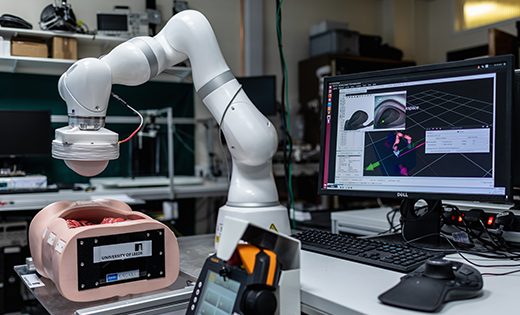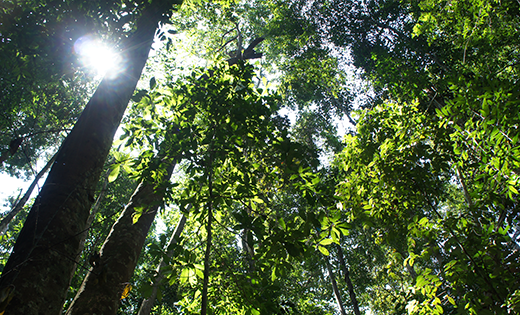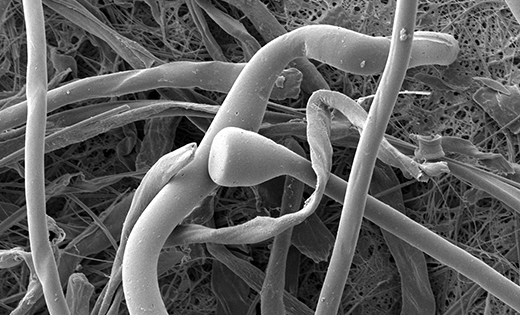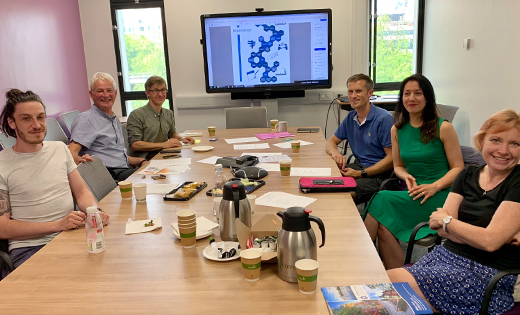Research Round-up – May 2020
Welcome to the latest instalment of our monthly feature series throwing the spotlight on our research success stories.
New research suggests tropical forests can store carbon despite rising temperatures. Photo: Dr Lindsay F Banin

The strength of our research is in making a real and telling difference to the world around us, by working across traditional boundaries to find innovative solutions to some of the greatest challenges facing society today.
Here we highlight some of latest projects being pioneered by the expertise and efforts of the highly talented research community at Leeds.
From grant awards to examples of outstanding interdisciplinary work and best practice, we’re keen to showcase your research achievements. See the foot of this article for details of how you can get involved.
Featured in this month's round-up:
- Covid-19's impact on international trade and the food system
- New EU funding for miniature robot that can detect disease
- On your (electric) bike!
- The storm chasers making life-changing weather forecasts
- Tropical rainforests can handle the heat, up to a point
- Funding to help stop fibrous microplastics pollution
- stage@leeds takes performance online
- Parks in a pandemic: a glimpse into the future?
- Major plastic packaging waste recycling reforms needed
- Revealing the links between education and a good diet
- Can mosquitos inspire future tech to ensure no more collisions?
- WRUC Collaboration Fund
- REF2021 open meetings
- How to feature in future research round-ups
Research on the coronavirus pandemic's impact on international trade and the food system has been presented to key figures in the House of Commons
Covid-19's impact on international trade and the food system
Fiona Smith, Professor of International Economic Law, gave evidence to the House of Commons’ International Trade Committee on the effects of coronavirus (covid-19) on international trade and its impact on the food system.
Professor Smith spoke about several different issues in her testimony, including:
- the difficulty of diverting food away from restaurants and into supermarket supply chains
- the problems some farmers in the UK are having when sourcing animal feed, as it is imported from countries affected by the virus
- moral responsibilities given that access to food is a human right; and
- workers across supply chains falling ill with covid-19.
She suggested that a potential next step for the UK could be to investigate new supply routes and information about trends in trade, which could be helpful in considering the long-term impacts. Professor Smith explained it will very much depend on whether countries will attempt to increase domestic production at the expense of global supply chains.
Professor Smith has published widely on international agricultural trade and has spoken about her research to public and private sector audiences throughout the world. In 2017, she was appointed Specialist Advisor to the House of Lords’ EU Energy and Environment Sub-Committee for its Report on Brexit and Agriculture. She has given evidence on the impact of Brexit on agricultural trade to the House of Commons’ International Trade Committee and the Welsh National Assembly, External Affairs and Additional Legislation Committee.
Watch the presentation at Parliament Live.
Funding has been granted to extend research into healthcare robots
New EU funding for miniature robot that can detect disease
More than €750,000 has been awarded to researchers at Leeds from the EU’s Research and Innovation Programme – Horizon 2020.
The funding will continue the work on science robots led by Pietro Valdastri, Professor and Chair in Robotics and Autonomous Systems, and will focus on the AUTOCAPSULE project. This aims to demonstrate the viability of a new technology that allows for the early diagnosis of Inflammatory Bowel Disease (IBD) and bowel cancer.
The technology can also monitor the effectiveness of treatment at primary or secondary point of care. Its vision is based on an untethered autonomous capsule that can:
- be implanted in the gastro-intestinal (GI) tract for several weeks in order to monitor a specific area; and
- explore the GI tract for endoscopy in a point of care, through magnetic manipulation with an external robotic arm and limited training of the operator.
Professor Valdastri said: “This project builds on our unique expertise in intelligent magnetic manipulation of diagnostic devices inside the human body and has the potential to revolutionise the field of gastrointestinal endoscopy.
“At the time of covid-19, a robotic approach to flexible endoscopy has the advantage of increasing the distance between the patient and the healthcare operator, thus reducing the risk of transmission. While this project was conceived before the pandemic, its results will benefit the field also from this perspective.”
University Academic Fellow, Dr Evangelos Mazomenos, who is working on the project, added: “This AUTOCAPSULE project will develop a robotic capsule that is magnetically controlled by an external robotic arm, allowing physical distance between patient and operator.
"Once inserted, the capsule will be implanted in the GI tract and autonomously monitor a specific area for several weeks, collecting information from various sensors, including micro-ultrasound imaging, white light imaging, pH and inflammation monitoring.”
Moving to electrically-assisted bikes could reduce CO2 emissions when we return to work from lockdown
On your (electric) bike!
New research has revealed that electrically-assisted bikes (e-bikes) have the capability to slash carbon dioxide emissions from transport and could offer a safe and sustainable route back to work.
Leeds researchers from the Centre for Research into Energy Demand Solutions (CREDS) found that e-bikes, if used to replace car travel, have the capability to cut carbon dioxide (CO2) emissions from cars in England by up to 50% – about 30 million tonnes per year.
Even replacing just 20% of car miles with e-bike travel would mean 4-8 million fewer tonnes of carbon emitted each year.
The greatest impact on carbon emissions would come from e-bike use outside urban centres. In Denmark, e-bike routes are already linking cities to towns and villages.
e-bikes can help people make longer journeys than conventional cycles, and could bring new transport options to people living outside urban centres. In the post-coronavirus recovery, e-bikes could offer a safe way for people to travel.
Researchers also found that e-bikes could help cut the costs of travel in neighbourhoods characterised by low incomes, limited access to public transport and where many car journeys could be replaced with e-bike use.
Dr Ian Philips, from the Institute for Transport Studies, who is a CREDS member, led the research. He said: "The strategic potential of e-bikes as a mass-transport option has been overlooked by policymakers so far.
"The research began as a way to measure the potential carbon savings that e-bikes can offer, but as we emerge from the lockdown, e-bikes can be part of the solution to getting people safely mobile once again.
“We’re recommending that governments across the UK should find ways to incentivise e-bike use to replace car journeys. As well as lowering carbon emissions from transport, e-bikes have the potential to improve the mobility options for people and communities at risk of transport poverty.”
Weather forecasters in Africa are getting access to satellite data that will allow them to track the path and severity of developing storms – and reduce the death toll from extreme weather events.
An initiative called African SWIFT has enabled meteorologists to make accurate, hour-by-hour forecasts as severe weather approaches, a technique known as 'nowcasting' – very-short-range weather forecasting.
The project was led by Leeds with nearly £8 million of funding from the Global Challenges Research Fund (GCRF).
Doug Parker, Professor of Meteorology and co-lead of African SWIFT, said: "The essence of a nowcasting alert might be 'there is a storm very close to you, and it is heading your way'. Users can understand this message and recognise the kinds of action they need to take.
"Sometimes the storm does not reach them, and sometimes it does, but the essential message we give them about the storm is correct. In this way, users gain confidence in the information from their weather service."
The technique is based on satellites monitoring changes happening in the atmosphere. It just takes 15 minutes for the information recorded in space to reach the forecasters' desks.
African SWIFT involves partnerships between the National Centre for Atmospheric Sciences, the University of Reading, academics and researchers and meteorological agencies in Ghana, Kenya, Nigeria and Senegal and the UK Met Office.
A seedling’s view in the dipterocarp-dominated sandstone hill forest in Kabili-Sepilok Forest. Photo: Dr Lindsay F Banin
Tropical forests can handle the heat, up to a point
Tropical forests face an uncertain future under climate change, but new research published in Science suggests they can continue to store large amounts of carbon in a warmer world if countries limit greenhouse gas emissions.
The world’s tropical forests store a quarter-century worth of fossil fuel emissions in their trees alone. There are fears that global heating can reduce this store if tree growth reduces or tree death increases, accelerating climate change.
An international research team measured more than half-a-million trees in 813 forests across the tropics to assess how much carbon is stored by forests growing under different climatic conditions today.
The team revealed that tropical forests continue to store high levels of carbon under high temperatures, showing that in the long-run, these forests can handle heat up to an estimated threshold of 32°C in daytime temperature.
Yet this positive finding is only possible if forests have time to adapt, they remain intact and if global warming is strictly limited to avoid pushing global temperatures into conditions beyond the critical threshold.
Lead author Dr Martin Sullivan, from Leeds and Manchester Metropolitan University, said: “Our analysis reveals that up to a certain point of heating, tropical forests are surprisingly resistant to small temperature differences. If we limit climate change, they can continue to store a large amount of carbon in a warmer world.
“The 32-degree threshold highlights the critical importance of urgently cutting our emissions to avoid pushing too many forests beyond the safety zone.
“For example, if we limit global average temperatures to a 2°C increase above pre-industrial levels, this pushes nearly three-quarters of tropical forests above the heat threshold we identified. Any further increases in temperature will lead to rapid losses of forest carbon."
Picture of microplastics up close taken by a scanning electron microscope
Funding to help stop fibrous microplastics pollution
More than £600,000 has been awarded to researchers at Leeds from the Engineering and Physical Sciences Research Council (EPSRC).
The funding has been granted to a team led by Dr Muhammad Tausif from the School of Design, who is pioneering research into fibrous microplastics.
Microplastics have been detected in all aquatic habitats, from deep oceans to polar ice melts, and can be found in the guts and tissues of aquatic animals. More than one third of microplastics found in the world’s oceans are fibrous microplastics from textiles.
The fibrous microplastics are released throughout the lifecycle of a textile and their presence in aquatic and terrestrial environments is now well understood. The washing of textiles releases an estimated 500,000 tonnes of these microplastics into the world’s oceans, which is expected to accumulate to 22 million tonnes by 2050.
EPSRC funding will bring academia and industry together, to look at finding a novel solution to this problem by stopping microplastics ‘at source’. This can be done by uncovering fibre damage, both experimentally and computationally, that leads to the generation of fibrous microplastics. From this, predictive computational modelling can inform the engineering of innovative textile structures that stop the release of these fibrous microplastics in textiles.
Dr Tausif said: “We are excited to commence this pioneering EPSRC project addressing the challenge of microplastic pollution from textiles.
“This project brings together an interdisciplinary team from the fields of textile technology, tribology and computational engineering to build systematic and fundamental understanding of fibre damage during manufacturing, use and service. With the support of UK and multinational project partners, we will develop robust, widely applicable and industry-relevant solutions to stop fibrous microplastics 'at source'.
“This grant will reinforce our ongoing research activities and capabilities in sustainable textile manufacturing, and will allow bespoke manufacturing of textile yarns, key element of textile fabrics, at Leeds. The project outcomes are expected to cross-fertilise a range of disciplines.”
Contact Dr Tausif or further information about this project.
Staff at Leeds are exploring how theatre can be adapted for our online lives through stage@leedsDigital
stage@leeds takes performance online
stage@leeds has developed a new digital platform – stage@leedsDigital – for showcasing creative work, encouraging research and exploring how traditional theatre can move online.
The virtual performance platform provides students, researchers and artists with an environment to promote, broadcast and share work that has been specifically created for the digital realm.
At this time of year, the theatre team would be preparing our venues for the start of a busy new term and theatre schedule packed with work from students and professional artists. However, like many theatres across the country, stage@leeds has temporarily closed its doors due to the coronavirus pandemic.
To continue its support and ongoing commitment to the creative development of students, researchers, schools and professional theatre companies, and supporting the production of dynamic and innovative performances, the stage@leeds theatre team has been working hard to move its offering online.
Steve Ansell, Artistic Director and Theatre Manager of stage@leeds, said: “stage@leedsDigital was created to support staff, students, researchers and professional artists forced to work remotely due to the coronavirus pandemic.
"However, it is my hope that as things improve, stage@leedsDigital will provide a dynamic platform for digital creatives and researchers long into the future, establishing itself as simply another stage for stage@leeds.”
The platform will also provide technical support and host assessments for undergraduate and postgraduate students in the same way that stage@leeds does.
Visit the stage@leeds website for further information about stage@leedsDigital.
Has the pandemic shown us the necessity of parks in cities?
Parks in a pandemic: a glimpse into the future?
Dr Anna Barker – Lecturer in Criminal Justice and an expert in regulation and policing of public space – has co-authored a piece with Dr Andrew Smith at the University of Westminster titled 'Parks in a Pandemic: A Glimpse into the Future?' for Discovery Society.
The research looks to the future of parks and what this might look like. During the ongoing covid-19 pandemic, the media has shone a light on the use of parks and green spaces and their importance in urban spaces, especially for those with no outside space of their own.
This article looks at the changes the pandemic has brought for parks, discusses how the pandemic could have potential long-term ramifications for their future and seeks to identify some of those ramifications.
University research has revealed the limitations of plastic packaging
Major plastic packaging waste recycling reforms needed
Significant changes to the way that plastic packaging waste is recycled in England are needed in order to eliminate avoidable plastic waste by 2043 and meet Government ambitions.
A new study has found that the current system of collecting and managing plastic packaging waste disadvantages local authorities and discourages efforts to invest in green infrastructure to exploit technological change.
This leads to an over-dependence on exporting waste to markets with questionable recycling policies and also impairs consumer decision-making about how to dispose of plastic packaging waste.
The report – ‘Plastic packaging: How do we get to where we want to be?’ – found that the cost of collecting and managing waste under the current system meant that some local authorities were forced to tie themselves to contracts as long as 25 years to make it economically viable.
The study was funded by the Plastic and Research Innovation Fund and the Economic and Social Research Council, working collaboratively with the Department for Environment, Food and Rural Affairs (DEFRA), the waste management sector and other stakeholders.
The report analysed the UK’s plastic packaging system in England using a new systems approach termed ‘Complex Value Optimisation for Resource Recovery’ (CVORR).
Report co-author, Andrew Brown, Professor of Economics at Leeds, said: “The report shows the importance of a deep collaboration between economists, engineers and environmental scientists, also working collaboratively with DEFRA, the waste management sector and other stakeholders.
“In order to take advantage of huge long-term opportunities for value preservation and creation through plastic packaging recycling, change is required in the whole system, guided by the new CVORR framework.”
Educational status appears to have positive influence on a healthy diet, particularly in low income countries, according to new research examining European nutritional data.
Using national data on 27,334 individuals from 12 European countries, researchers at Leeds, in collaboration with the World Health Organisation Regional Office for Europe (WHO Europe), examined the interactions between socioeconomic status, education and diet.
Their study shows for the first time that higher educational status appeared to have a mitigating effect on poorer diet in lower income European countries.
As individual education levels increased, so did nutritional intake encouraged as part of a healthy diet, particularly iron and total folate.
The findings highlight the need for strong policies supporting good nutrition, prioritising lower education groups.
Poor diet and malnutrition linked to noncommunicable diseases, such as obesity, hypertension and cardiovascular disease, presents major health problems across Europe. In 2018, 59% of adults in the WHO European Region were overweight or obese. Noncommunicable diseases are the leading cause of death, disease and disability in the region.
Lead author, Dr Holly Rippin, began this research while a postgraduate researcher in the School of Food Science and Nutrition; she is now a WHO consultant. She said: "Our study shows that national income and diet quality appear to be linked, and education could protect against some of the long-term negative effects of poor nutrition on population health.
"Strategies supporting education in lower education groups and lower income countries could be effective in improving nutrition, particularly in disadvantaged groups."
Scientists have used the principles that guide a mosquito’s nocturnal flight to develop a quadcopter equipped with an elegant collision-avoidance sensory system.
Their research demonstrates how the mosquito avoids obstacles in the dark by sensing changes in the airflows generated by its flapping wings.
The international collaborative research group, which includes Dr Simon Walker from the School of Biomedical Sciences at Leeds, used the understanding of the sensory mechanism in the male Culex quinquefasciatus mosquito to develop a bio-inspired collision avoidance system for an autonomous quadcopter, which encodes aerodynamic information on the fly.
Nocturnal mosquitoes navigate in the dark without crashing into surfaces. When they land on humans or other animals to feed, they do it very gently in order to remain stealthy; being noticed could spell disaster. Since these nocturnal mosquitoes cannot see what they are doing with their eyes, they use a different sensory mode – mechanosensing.
Mosquitoes, and other flying animals, fly by accelerating the air around them, creating fast jets beneath each flapping wing. These jets change shape in the presence of obstacles, such as the ground or walls.
Thanks to an exquisitely sensitive array of receptors at the base of the antennae on mosquitoes' heads, called the Johnston’s organ, the mosquito can detect these changes in airflow patterns. The researchers called this 'aerodynamic imaging': it gives the mosquito a picture of the world around them even in the dark and when they cannot feel surfaces by physical contact.
Dr Walker said: “Mosquitoes represent an outlier within insects with their elongated wings and extremely high flapping frequency. We already know that they use unconventional aerodynamics during flight and this research provides another piece to the puzzle of their evolution, as well as inspiring technology for use by engineers.”
Dr Gemma Traviss-Turner's research team utilised WRUC funding to take their project to greater heights
WRUC Collaboration Fund
The White Rose Collaboration Fund – operated by the White Rose University Consortium (WRUC) – is now open for applications.
The fund supports and encourages emerging partnerships across the Universities of Leeds, Sheffield and York, in particular to support projects that have the potential to lead to larger, more strategic initiatives.
The maximum award has been increased by a third to £15,000, allowing projects a larger expenditure and scope, often resulting in further funding down the line.
Recent examples of White Rose Collaboration Fund success include Dr Gemma Traviss-Turner's project looking at weight management for adults with severe mental illness.
Dr Traviss-Turner said: "White Rose funding enabled us to extend an existing collaboration to work up a £2.7m programme grant addressing the important issue of supporting physical activity through co-production in people with severe mental illness."
Applications are open via the applications page until Tuesday 30 June.
Register via email to attend REF2021 open meetings via Teams.
These will provide an update from the University’s REF Steering Group on our continuing preparations for submission and how we are responding to changes to the national timetable.
Meetings are from 10am to 12 noon on Wednesday 8 July and 2-6pm on Tuesday 14 July. Quote ‘open meeting’ in the email subject line, and include your name, school and preferred date.
Please contact Internal Communications if you or one of your colleagues would like to appear in this monthly feature.
Posted in: University newsResearch and innovation








